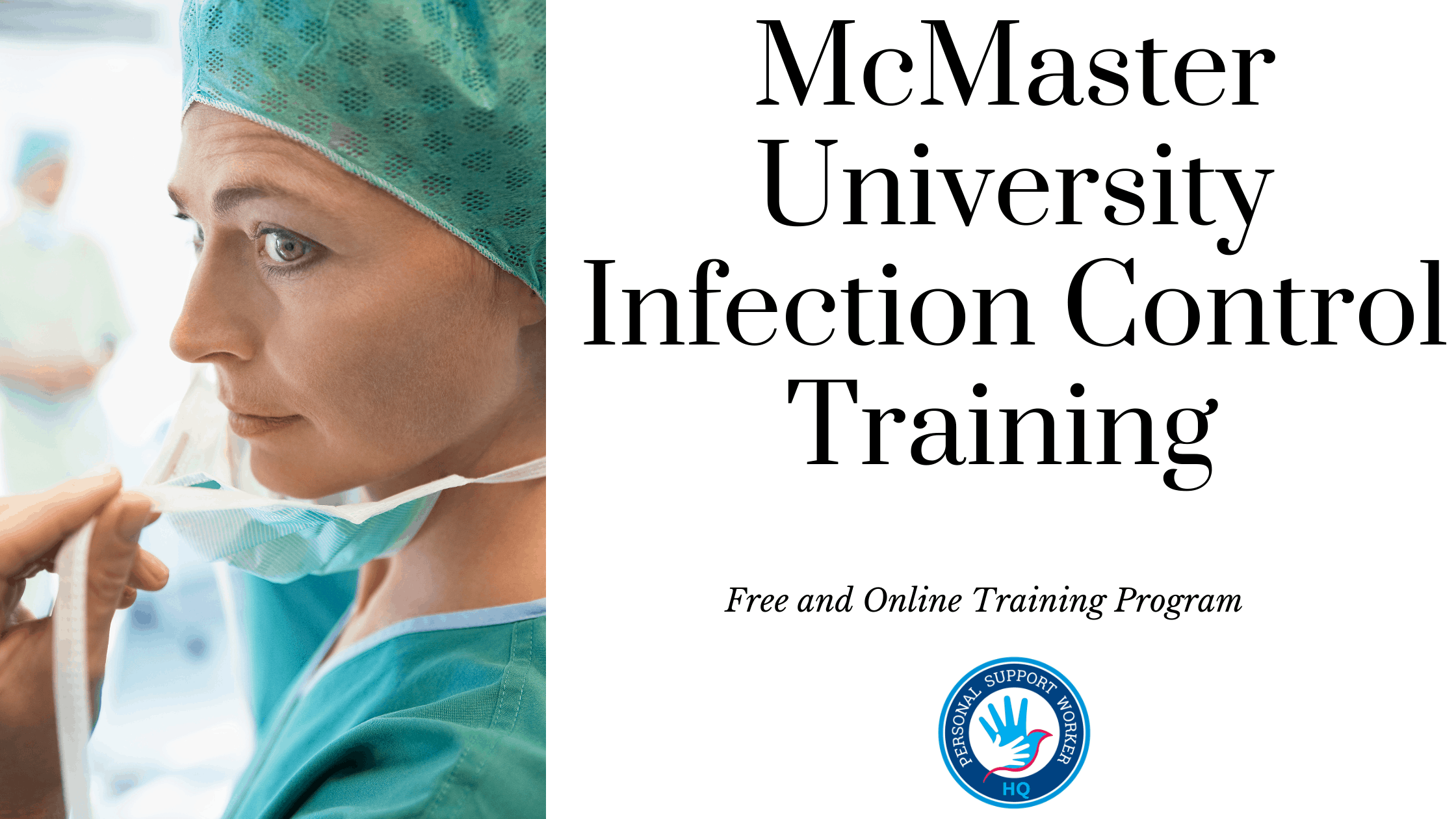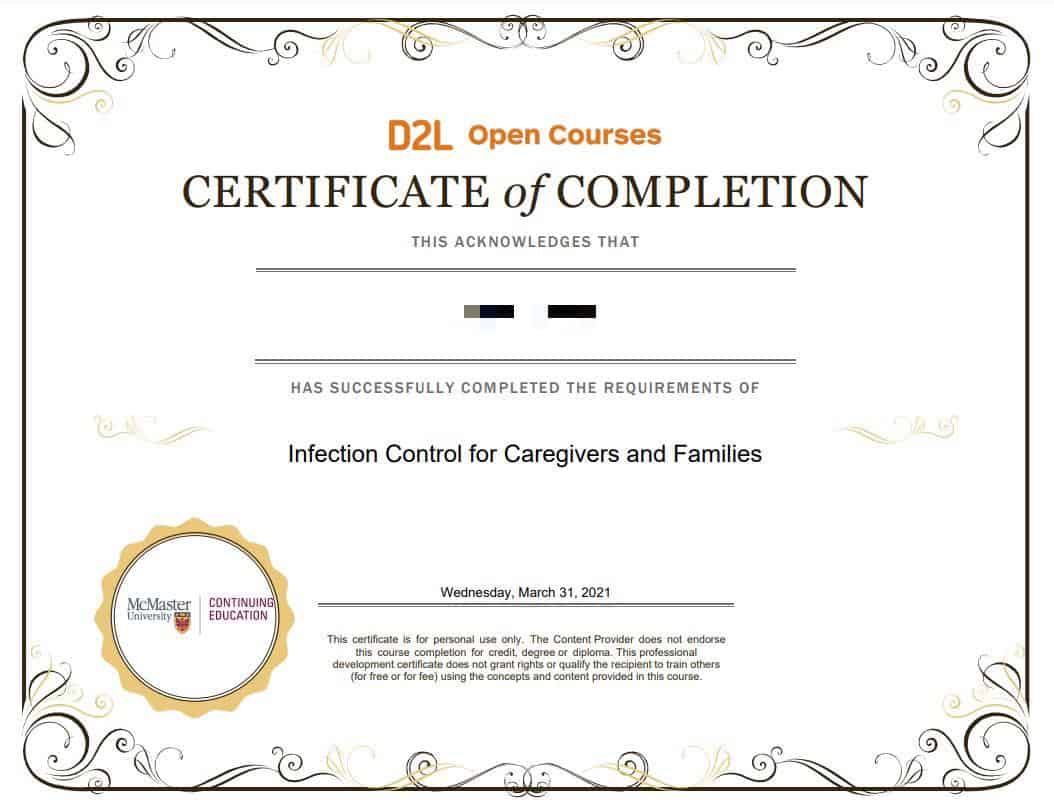
As a caregiver, infection prevention is the single most important activity you can undertake.
It is something that you must be mindful of at all times.
Infection control helps prevent or reduce the spread of infectious diseases from one person to the other.
It breaks the chain of the spread of infectious agents.
Proper infection prevention and control practices are essential to keep everyone safe.
Personal Support Worker plays an integral role in infection prevention and control.
There are many avenues available to learn infection control strategies.
McMaster University’s continuing education provides an excellent opportunity for you to learn infection control strategies.
Training With McMaster University
McMaster University offers a free program for you to enhance your infection control learning.
The program is completely online and can be completed at your own pace.
After the successful completion of the program, you will be awarded a certificate of completion.
You can download and print the certificate for your records.
You do not need any additional study material for this program. Everything you need is provided.
Who is the Training For?
This is a free training program and anyone is welcome to register.
There are no prerequisites for this training.
Infection control training is especially suited for Personal Support Workers and other caregivers.
You must complete the training by February 10, 2022.
Please note that this training is meant to enhance your knowledge to keep you and your care recipient safe.
This training does NOT provide you a designation nor is equivalent to a PSW diploma.
The Training Description
The course consists of five modules.
Each module focuses on an important aspect of infection prevention and control.
Throughout the course, there are four quizzes that you must complete.
Please note that a certificate will only be awarded if you score 100% on each quiz.
You can however attempt the quizzes multiples times.
All the training is self-paced.
Module 1
Module 1 focuses on the role of the caregiver and infection control.
You will learn the importance of your role, especially in times such as the current pandemic.
In this module you will learn the following:
- Your role as a care provider,
- Multiple aspects of your role as a care provider,
- Caregiving and infection prevention and control,
- Resources for COVID-19, and
- Introduction to other caregiving resources.
Module 2
Module 2 of the training focuses on the essential elements of infection prevention and control.
You will learn the transmission methods of infectious agents and how you play a vital role in breaking the chain of transmission.
In this module you will learn the following:
- Important terms associated with infection control,
- The importance of infection control,
- The chain of transmission,
- Links in the chain of transmission,
- Breaking the chain of transmission, and
- Standard/Routine infection control precautions.
Module 2 is followed by a quiz.
Module 3
Module 3 focuses on effective hand hygiene techniques.
Hand hygiene plays an important role in breaking the chain of transmission.
It is a simple and basic task that you can perform to prevent the spread of germs.
In this module, you will learn the following:
- The basics of hand hygiene,
- When to wash your hands,
- Hand hygiene methods,
- Barriers to effective hand hygiene, and
- Becoming an advocate for those you care for.
Module 3 is followed by a quiz.
Module 4
Module 4 focuses on Personal Protective Equipment (PPE) donning and doffing techniques.
In addition, the module provides you knowledge on what type of PPE to choose.
In this module you will learn:
- The basics of PPE,
- Donning and doffing of PPE,
- Various types of PPE,
- Standard and transmission precautions,
- Guidelines for wearing PPE, and
- Becoming an advocate for those you care for.
Module 4 is followed by a quiz.
Module 5
Module 5 focuses on the importance of keeping the care environment clean.
It is important to realize that cleaning an environment in care settings is different from the non-care settings.
In this module you will learn:
- Ways to prevent the spread of infection,
- The basics of cleaning in care environments,
- Cleaning and disinfecting,
- PPE and cleaning,
- The frequency of environment cleaning in care settings,
- The principles of environmental cleaning, and
- Environmental cleaning techniques.
Module 5 is followed by a quiz.
How to Register?
In order to access the online infection control strategies course by McMaster University, you will have to register with D2L open courses.
Once you register, you will be able to access the course.
You can complete the course at your own pace.
How to Print Your Certificate?
There are five modules and four quizzes in this training.
You will have to complete a quiz after modules 2, 3, 4, and 5.
You will be awarded the certificate if you score 100% on all four quizzes.
You can however attempt the quizzes multiple times.
The certificate is provided by McMaster University, continuing education.

After you have completed all four quizzes and have scored 100% on each quiz, your certificate will appear in the “Awards” section of the course.
You can download a pdf copy or print your certificate from this section.







Hi there.
Can you make this content available for inclusion in an organization’s LMS? We use Surge Learning as our training platform, and it would be helpful for us to make the content available there.